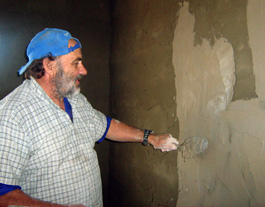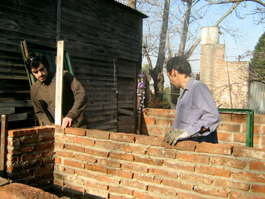Economic impact through incremental and complete housing solutions -- Habitat for Humanity Int'l 1
Economic impact through incremental and complete housing solutions
By Demostenes Moraes, Mary Lechenuk, Andres Maidana Legal and Ana Cutts
|
|

A Habitat partner family member participates in masonry tasks in Habitat for Humanity Argentina’s progressive improvements program.
|
|
|
|
|
|

A volunteer architect assesses the progress of a home addition, part of Habitat for Humanity Argentina’s progressive improvements program.
|
|
|
|
|
|
Learn more:
General factors of adequate housing
|
|
|
|
The factors of adequate housing as defined by the United Nations — legal security of tenure, availability of services and infrastructure, affordability, habitability, accessibility, location, cultural adequacy — work together to ensure that housing can allow its inhabitants to produce economic benefits for both the family and the community as a whole.
A healthy neighborhood, and an inclusive city, start with housing that has optimum conditions for habitability.
But in most Latin American and Caribbean countries, the ability to access complete housing solutions all at once is a luxury enjoyed chiefly by the middle and upper classes. Lower-income families must improve their homes in stages, often taking up to 20 years to reach the same objective. Although progressive housing solutions provide affordable, immediate options for home improvement, these incremental methods must not lose sight of the final objective of a complete, adequate house that meets the standards established by the United Nations. To ensure that families are not “overinvesting” during the lengthy process of developing their homes, it is vital that programs improve both the quality and the time involved in progressive construction.
Thus, when contemplating progressive home improvements, it is important to first consider the immediate economic advantages distinct to complete housing solutions, including:
- Access to the formal financial sector. A complete housing solution creates immediate capital for a family, allowing them to “exist” within the formal market. This new access to credit can be used for small businesses, additional home improvements or other family consumption needs. For this capital to exist, housing solutions must include legal tenure.
- Influence in economic decisions of the nuclear family. Homeownership influences decisions regarding a family’s short- and long-term economy, such as whether to change jobs, where to send children to school, the cost of public transportation, etc.
- Self-esteem and social status. One of the most important factors of homeownership is the image of the family to themselves and society. Societal recognition of one’s home as a “house” often affects one’s ability to obtain formal employment. Although small improvements can drastically change the quality of life within a house, they are less likely to change the self-esteem of a family until society ceases to see the house as a “shack.”
In Buenos Aires, Argentina, for example, a family emerging from a context of poverty will feel they have “made it” only if the house has a floor covering such as ceramic or tiles, if the bathroom has a bidet, and if the plot of land is adequately enclosed with an entrance gate and pathway to the front door. Infrastructural conditions are also a factor—paved rather than gravel roads, for example. In Paraguay, a house needs to meet the basic needs of security and hygiene, including running water, electricity and sewage. These are cultural aspects that are not necessarily the same as minimum standards of housing as perceived by housing organizations.
- Stability and community belonging. Homeownership changes the social fabric of communities. A classic example in Paraguay is the emergence of neighborhood associations that work to improve community infrastructure, such as streets, pedestrian walkways and public lighting. The work of these associations helps to create interfamilial ties and raise the economic value of the neighborhood. The associations also increase the opportunity and likelihood of families to invest in home improvements, thus increasing the value of the individual homes.
- Immediate relief from home repair expenses. A complete housing solution frees families from having to repair problem areas. If funds that went into temporary solutions can instead be invested in savings, there is a greater potential for home expansion instead of repairs. Incremental housing solutions aim to achieve these economic advantages over time and according to the family’s financial capacity to commit to a loan. Other economic effects can be distinct to the progressive approach, such as:
- Ability to establish and strengthen small home businesses. As a significant portion of low-income families’ economic resources come from home businesses, progressive improvements are ideal for creating or adapting spaces for economic activities.
A survey conducted by Habitat Argentina on a progressive improvements project revealed that after the home improvement, families began to consider options for home businesses that would meet basic needs of the community.
In Brazil, large financial service providers are developing housing improvement programs that allow for spaces that can be used for small-business activities. Habitat Brazil is building relationships with these banks to develop large-scale programs that associate credit with technical assistance, including the possibility of creating additional space for home businesses.
An unexpected outcome of Habitat Brazil’s Varjada Project, the creation of a women’s association for the production of embroidery products, was possible only with the construction of communal cisterns. Before the project, women spent a large part of the day gathering water from sources far from their homes, leaving little time or energy for income-generating activities. In addition, precarious housing conditions had complicated the integrity of the women’s products and did not allow for an adequate home workspace.
Habitat for Humanity Paraguay’s home repair, amplification and improvement project in Areguá partners with the Loma Clavel association of handicraft producers, who work out of their homes, helping them to improve conditions and raise the quality and quantity of their production.
We must remember, however, that several aspects must be considered in the design, implementation and technical support given to home business adaptations.
- Separating home from work. Living and working in the same environment can be stressful and unhealthy, particularly if the business involves production (carpentry, cooking, sewing, etc). For this reason, it is necessary to separate the workshop from the home, with separate entrances if possible.
- Electricity and water. The electrical appliances of a workshop often exceed the voltage of a family home. In many settlements, this can mean risk of explosions and fires. In addition, some enterprises require water use and waste disposal that may exceed that of a normal household.
- Security. In most settlements, security is an issue whether it is in the workshop or the home. A home business may require additional security (a food shop, for example, has a higher security risk than a home bakery).
- Ventilation and lighting. When concentrated for long hours on some form of production, workers need both fresh air and adequate lighting in a home-workshop environment.
- Resolution of specific home improvement needs. The decision to invest part of a family’s resources in home improvements is influenced by factors both internal and external to the family sphere. For example, adolescent children need their own space to sleep.
From the perspective of the family’s satisfaction with the change, the results of a progressive solution can be similar to those of a complete housing solution. Such improvements imply a quantitative impact, as they increase the value of the home, and a qualitative impact, in that they respond to an immediate need, resulting in greater comfort, reduction of risks to health and security, and a general improvement to quality of life — all of which result in an indirect improvement to home economy.
- Ownership of the housing process. Incremental home improvement programs tend to require greater involvement of the family for decisions. This leads to greater ownership of the entire process and affects subsequent responsibility for the maintenance of the house. In Argentina, families with complete solutions at times call on Habitat to fix problems in their homes, seeing Habitat as the “owner” of the solution even though the family participated in the construction process. But families who have received loans for improvements have a distinct sense of ownership of the housing solution.
Although they are often the most affordable and appropriate option for low-income families in Latin America and the Caribbean, incremental housing solutions do have certain economic disadvantages. In the long term, they could be more costly than housing obtained in a direct and complete manner.
With the help of loans that can lower the typical 20- to 30-year period, families still find themselves investing in their house over the course of 10 to 15 years. With a complete housing solution, monthly payments over 15 years are lighter on the family budget and allow the family to work toward improving their economic situation more so than a family that continues living in partially inadequate conditions throughout the incremental construction process.
Nevertheless, 95 percent of the families interviewed after the progressive improvements project expressed that the home improvement created a benefit.
Thus the manner and timeline by which the gamut of economic effects of adequate housing becomes visible depends on programs designed to help families work toward this goal while improving their home economy through a variety of housing solutions and technical assistance that meets their current financial capacity. In Latin American countries, the economic and contextual situation of many families is such that incremental solutions and complete house solutions are equally necessary. When there is a plan for progressive improvements that contemplates the time and quality of the housing solution, as well as adequate space to live and to work, and without losing sight of the final goal of a complete, adequate house, families have a greater chance at economic development.
Demostenes Moraes is national director of Habitat for Humanity Brazil. Mary Lechenuk is national director of Habitat for Humanity Paraguay. Andres Maidana Legal is an architect at Habitat for Humanity Argentina. Ana Cutts is national director of Habitat for Humanity Argentina.